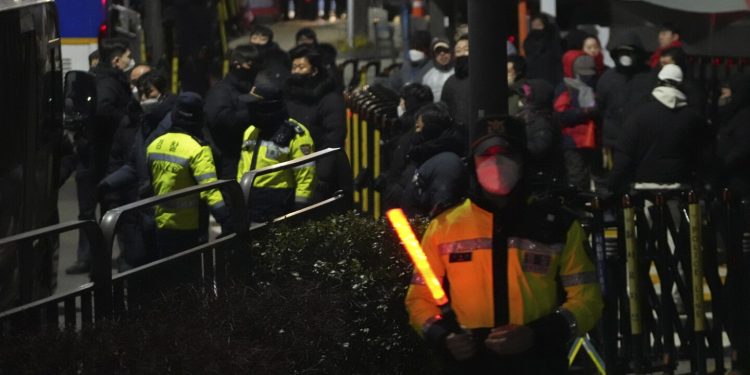SEOUL, South Korea (AP) — Hundreds of South Korean law enforcement officials entered deposed President Yoon Suk Yeol’s residential compound in the capital Seoul on Wednesday morning. It was their second try to detain him following the imposition of martial law last month.
More than a thousand anti-corruption investigators and police officers could be deployed in the operation to apprehend Yoon, who has been holed up in the Hannam-dong residence for weeks.
Yoon had not been apprehended as of Wednesday morning, as investigators from the Office of Investigation of Senior Officials Corruption negotiated with the president’s lawyers. Yoon’s lawyers were trying to persuade investigators not to execute the arrest warrant, saying the president would voluntarily present himself for questioning, but the agency told reporters it was not immediately considering that option.
No clashes were immediately reported.
The anti-graft agency is conducting a joint investigation with the police and military to determine whether Yoon’s memoir declaration of martial law On December 3, it was an attempted rebellion and attempted to detain him after ignoring several summons for questioning.
Yoon justified his martial law decree as a legitimate act of governance against an “anti-state” opposition that is bogging down his agenda with its legislative majority and vowed to “fight to the end” against efforts aimed at oust.
The Senior Officials Corruption Investigation Bureau and police are jointly investigating whether Yoon’s memoir declaration of martial law December 3 amounts to an attempted rebellion. They vowed to take stronger action to stop him after presidential security blocked their initial efforts on January 3.
After an hours-long standoff at the entrance to the complex, anti-corruption investigators and police were seen climbing the hilly complex. Police officers had previously been seen using ladders to scale rows of buses placed by presidential security services near the entrance to the complex.
Anti-corruption investigators and police then arrived at a metal gate bearing a gold presidential mark, located near Yoon’s residential building. Some police officers were seen walking through a security door at the side of the metal gate, escorted by one of Yoon’s lawyers and his chief of staff, but it was not immediately clear why they were allowed in. Presidential security services then removed a bus. and other vehicles that were parked tightly inside the gate as a barricade.
Seok Dong-hyeon, a lawyer for Yoon, said the residence’s lawyers were negotiating with the anti-graft agency over the possibility that the president could voluntarily come forward for questioning.
It was unclear whether law enforcement would accept the offer from Yoon’s lawyers, as the president had previously evaded several requests to appear for questioning before the agency sought arrest warrants for his detention . Despite a court warrant for Yoon’s arrest, presidential security insisted they were obligated to protect the deposed president and fortified the compound with barbed wire and rows of buses blocking passageways.
As tensions escalated, South Korea’s interim leader, Vice Prime Minister Choi Sang-mok, issued a statement on Wednesday calling on law enforcement and presidential security services to ensure that there are no “physical confrontations”.
The liberal opposition Democratic Party, which led a legislative campaign that led to Yoon’s impeachment on Dec. 14, issued a statement calling on the presidential security services to stand down and cooperate with Yoon’s detention. Lawmakers from Yoon’s People Power Party held a rally near the presidential residence, denouncing efforts to arrest him as illegal.
Yoon’s lawyers said presidential security services would continue to provide Yoon’s security and claimed the detention warrant issued by the Seoul West District Court was invalid. They cited a law that protects places potentially linked to military secrets from searches without the consent of the person responsible – believed to be Yoon. The court’s warrant for Yoon’s detention is valid until January 21.
Hundreds of Yoon’s supporters and critics staged competing protests near the residence – one side vowing to protect him, the other calling for his imprisonment – while thousands of police in yellow jackets closely monitored the situation , establishing perimeters with buses.
Yoon’s top aide pleaded with law enforcement on Tuesday to abandon efforts to arrest him. Presidential chief of staff Chung Jin-suk said Yoon could instead be questioned at a “third-party site” or at his residence and said the anti-graft agency and police were trying to get him out as if he was a member of a “South American drug group.” cartel.”
But Yoon Kab-keun, one of the president’s lawyers, said Chung posted the message without consulting them and that the legal team had no immediate plans to make the president available for questioning. by investigators.
If investigators manage to arrest Yoon Suk Yeol, they will likely ask the court for permission to make a formal arrest. Otherwise, he will be released after 48 hours.
Yoon hasn’t left his official residence in Seoul for weeks, and the presidential security service blocked dozens of investigators from arresting him after a nearly six-hour standoff on January 3.
The National Police Agency has convened several meetings of field commanders in Seoul and neighboring Gyeonggi Province in recent days to plan their arrest efforts, and the size of these forces has fueled speculation that more than A thousand officers could be deployed in a possible multi-day operation. The agency and police have openly warned that presidential bodyguards who obstruct the execution of the mandate could be arrested.
Yoon declared martial law and deployed troops around the National Assembly on December 3. It only lasted a few hours before lawmakers managed to break through the blockade and vote to lift the measure.
Yoon’s presidential powers were suspended when the opposition-dominated assembly voted to impeach him on December 14, accusing him of rebellion. His fate now rests in the hands of the Constitutional Court, which has begun deliberating whether to formally remove Yoon from office or dismiss the charges and reinstate him.


